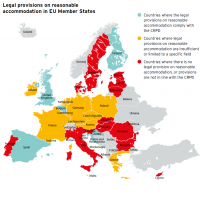
EU discrimination law doesn’t account for cases of multiple discrimination
EU law falls very short of protecting Europeans that suffer multiple forms of discrimination, such has children and older persons with disabilities, or persons with disabilities that are LGBTI+ or part of ethnic minorities.
This is the conclusion of EDF’s third European Human Rights report, which analyses how European countries are guaranteeing the rights of persons with disabilities. The report concludes that while, most EU countries do have laws to protect from discrimination these laws are either not well applied, or don’t go far enough. It also concludes that “piecemeal” equality legislation (different laws for different minorities) results in lack of protection for persons with disabilities that are also part of other protected groups (Children, older persons, LGBTI, ethnic minorities, refugees and asylum seekers for example).
Kamil Goungor, chair of the EDF Youth Committee shares an example:
As a disabled person, it’s already difficult to get a job, but it’s twice as difficult if you are young and disabled. Because you not only face accessibility issues, but you also have to demonstrate your experience. And how can you gain experience when a young disabled person faces a lot of barriers in order to even find an internship?
The report calls on the EU to adopt a broad an ambitious legislation that protects all people from all forms of discrimination. Such legislation was never adopted, despite years of calls by several anti-discrimination groups.
The reports recommend that:
EU and Member States should repeal all discriminatory laws and eliminate discriminatory practices.
The EU and Member States need to combat all forms of discrimination on the grounds of disabilities. They need to tackle discrimination of persons with disabilities that also belong to other minorities (women and girls, children, older persons, persons of asylum seekers and refugees, LGBTI).
The EU needs to ensure that non-discrimination and accessibility are ensured in the use of EU funds
Persons with disabilities need to be continuously involved in all that impacts them
The EU and Member States need to collect more data relating to persons with disabilities.
The EU and Member States need to provide more training on reasonable accommodation applicable to all areas of life.
Legal aid, legal action and compensation should be available to persons with disabilities that are victims of discrimination.
Yannis Vardakastanis, President of the European Disability Forum said:
EDF’s vision for Europe is a Europe where equality is guaranteed for all. The EU’s motto is “United in diversity”: this will only happen if you have a broad non-discrimination legislation.
Tena Šimonović Einwalter, Chair of the European Network of Equality Bodies, added
There needs to be more of a focus on multiple discrimination, multiple identities and in particular intersectionality when tackling underreporting and advocating for legislative change.
This will enable a better understanding of and a more effective response to the real-life experiences of people experiencing discrimination, as well as addressing issues of structural discrimination. We all – the EU and Member States, equality bodies and civil society organizations - need to work together towards achieving equality and ensuring non-discrimination for everyone in all aspects of their lives. This way, everyone can be empowered to fully participate in society and have equal access to existing opportunities in Europe.
